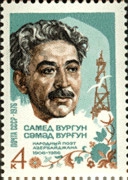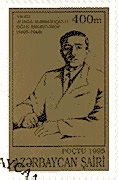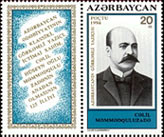
Spring 1996 (4.1)
Editorial
Contemporary
Literature
Editor, Betty Blair

 Azerbaijanis
for centuries have been known as a nation of poetry lovers. A
stroll through the center of Baku reveals nearly two dozen statues
honoring literary figures from the 12th century to the present
day. But what is happening with contemporary literature? Has
the legacy of great writers continued? Are writers thriving or
merely surviving? Are new themes and new forms emerging?
Azerbaijanis
for centuries have been known as a nation of poetry lovers. A
stroll through the center of Baku reveals nearly two dozen statues
honoring literary figures from the 12th century to the present
day. But what is happening with contemporary literature? Has
the legacy of great writers continued? Are writers thriving or
merely surviving? Are new themes and new forms emerging?
These are the questions we wanted to explore in this issue. Azerbaijani
classical writers such as Fuzuli, Nizami, and Nasimi are relatively
well known so we deliberately have not dealt with them in this
issue. Admittedly, we've only barely touched on the contemporary
issues. Because of restraints of time and space, we haven't even
mentioned numerous contemporary writers that are very important
such as prose writers like Anar, Elchin, Chinghiz Abdullayev,
Yusif Samadoghlu and the Ibrahimbeyov brothers-Maqsud and Rustam
(see AI 3:2, 8, Summer 95), as well as poets like Bakhtiar Vahabzade,
Zalemkhan and others. Nor have we dealt with any Azerbaijani
writers and poets across the border in Iran such as Shahriyar.

 No
literature is ever created in a vacuum, isolated from the consciousness
of the past-Azerbaijani literature is no exception. We've tried
to touch upon some of the repressiveness that Soviet writers
experienced and how they tried to maintain their integrity. You'll
catch glimpses of such difficulties in the interviews with critics
and writers (see Talibzade,
Vurghun, Javid,
Ahmadli,
and Shikhli).
No
literature is ever created in a vacuum, isolated from the consciousness
of the past-Azerbaijani literature is no exception. We've tried
to touch upon some of the repressiveness that Soviet writers
experienced and how they tried to maintain their integrity. You'll
catch glimpses of such difficulties in the interviews with critics
and writers (see Talibzade,
Vurghun, Javid,
Ahmadli,
and Shikhli).
Azerbaijan did not have dissident writers during the Soviet period
according to Vagif
Samadoghlu, who is a poet himself as well as the son
of Vurghun,
one of Azerbaijan's foremost poets. Only Moscow and Leningrad
were able to "produce" dissident writers because they
had access to foreign embassies and international journalists.
"If we had tried to protest, no one would ever have known
because officials would have 'found' drugs and illegal foreign
currency in our apartments." Since Azerbaijani writers couldn't
be dissidents, many of them secretly began tucking away poetry
and prose for a future day.
Today's Obstacles
For some writers, these
manuscripts are slowly being pulled out of drawers and cabinets
and being dusted off shelves. But an entirely new set of obstacles
greet their efforts of getting published. The greatest difficulty
is economical-a problem which permeates every aspect of life
during this transition by all former Soviet Republics into a
market economy. No longer does the government pick up the tab
for printing. No longer are authors paid according to the number
of pages they produce. In many cases, authors have to pay for
the printing themselves and the imported paper makes the process
exorbitantly expensive. Life is not as conducive to concentration
and creativity as it once was because these days many writers
are obliged to take on two or three jobs just to survive.



Stamps featuring Azerbaijani
Writers
Left: Samad Vurghun.
Center: Fuzuli.
Right: Aliagha Vahid.
But there are other complexities
as well, including a major shift in language usage, transition
to a new alphabet and changes in readers' interests. Now with
independence, there is a
gradual shift away from Russian - subtle, but at the
same time, perceptible. It's probably accurate to say that the
direction has finally been set, favoring Azeri to become the
"prestige language" in Azerbaijan.


Stamps featuring Azerbaijani
Writers
Left: Nizami.
Right: Mammadgulizade.
Officially replacing Cyrillic with a modified Latin alphabet
has further complicated the literary effort. Typewriters don't
exist with all the new alphabet letters, and computers with their
interchangeable fonts are not in widespread use. Consequently,
since so little has been published in the new alphabet, very
few Azerbaijanis are completely comfortable with reading it.
This in turn, makes publishers hesitate to invest in publishing
the new script, so it becomes a vicious cycle, yet to be broken.
Not so long ago, I was browsing in a bookstore in Baku looking
for new books published in the Latin script (they're still quite
rare except for small works for children). One finally caught
my eye. I pulled it from the shelf, opened it and was surprised
to find all Cyrillic text inside. The shopkeeper explained, "We're
in transition. Maybe next time, the text can also be printed
in Latin. This time, they just did a new cover." Alphabet
transitions aren't new to Azerbaijanis. This is the fourth
time this century that the alphabet has been officially changed:
first, from Arabic script to Latin (1929) then to Cyrillic (1939)
and now back again to a slightly different version of Latin (1991).
(See AI's entire issue, "Alphabet
Transition", September 1993, Vol 1:3).
Azerbaijani
Themes
The dominate theme of
Azerbaijani literature has always been humanism. Writers mention
it quite often: "How can man remain human (meaning honorable),
in his relations with others when so many possibilities exist
for corruption and self-serving gratification and gain?"
But a new stage is being set in Azerbaijan on which to explore
man's inhumanity. The new literature is in search of a new identity
shaped by its own local indigenous characteristics and life experiences.
Now Azerbaijanis are beginning
to write about their own sufferings in the context of their own
history-not the Soviet interpretation of it. This includes historical
novels, short stories and poetry describing the Soviet takeover
in the 1920s, the Soviet army attack on Baku on January 20, 1990,
the war with Armenians over Karabakh, and the subsequent dislocation
of one million refugees. Today is clearly a period of introspection
and re-evaluation of works written during the Soviet period.
Fortunately, Azerbaijanis are not dumping writers simply because
they happened to have lived during that era; except for when
a specific writer produced only propaganda that served the state.
Emphasis in schools used to
be on Russian writers. More and more, Azerbaijanis are studying
native writers. Works are being re-read and re-evaluated for
their artistic merits, not political ideology. New categories,
never before imaginable, are being examined. "Repression
in Literature" explores the works of Azerbaijani writers
who were killed or exiled during the Soviet period such as Almas
Yildirim, Mikhayil Mushfig, Mammad
Amin Rasulzade, Ahmad Javad, Hussein
Javid and others. "Emigration Literature" examines
the works of those who fled the country before or shortly after
the Soviet takeover. "Literature of Southern Azerbaijan"
introduces Azerbaijani writers in Iran, such as the great poet,
Shahriyar. (See AI 1:3, 28. September 93).
A new literature is beginning to emerge in Azerbaijan though
it's still embryonic in form. But the process needs support from
the international community if it is to flourish. Azerbaijan
needs "Patrons of the Literary Arts" just as they've
needed "Patrons of the Performing and Graphics Arts."
Three avenues should be supported: the printing of Azerbaijani
writers into Azeri, as well as the publication of translations
both to and from Azeri. So few works have yet been translated
into foreign languages, with the possible exception of Russian
and Persian. This is where Azerbaijanis living abroad can contribute
greatly by identifying and translating works into the languages
of the respective countries in which they are living. It will
be a great day for Azerbaijani writers, for Azerbaijan as a nation,
and for humanity as a whole, when deserving works from contemporary
Azerbaijani pens are also included in the volumes that make up
the world's greatest and most cherished collection of literary
works. And why shouldn't such a day not come?!
Home | About
Azeri | Learn
Azeri | Arabic
Script | Store | Contact
us
Articles from Azerbaijan
International
© Azerbaijan International. Copyright 2002. All rights reserved.
|
|
 |
 |
 |
Stamps featuring Azerbaijani Writers
Left: Samad Vurghun.
Center: Fuzuli.
Right: Aliagha Vahid.
But there are other complexities
as well, including a major shift in language usage, transition
to a new alphabet and changes in readers' interests. Now with
independence, there is a
gradual shift away from Russian - subtle, but at the
same time, perceptible. It's probably accurate to say that the
direction has finally been set, favoring Azeri to become the
"prestige language" in Azerbaijan.
 |
 |
Stamps featuring Azerbaijani Writers
Left: Nizami.
Right: Mammadgulizade.
Officially replacing Cyrillic with a modified Latin alphabet has further complicated the literary effort. Typewriters don't exist with all the new alphabet letters, and computers with their interchangeable fonts are not in widespread use. Consequently, since so little has been published in the new alphabet, very few Azerbaijanis are completely comfortable with reading it. This in turn, makes publishers hesitate to invest in publishing the new script, so it becomes a vicious cycle, yet to be broken. Not so long ago, I was browsing in a bookstore in Baku looking for new books published in the Latin script (they're still quite rare except for small works for children). One finally caught my eye. I pulled it from the shelf, opened it and was surprised to find all Cyrillic text inside. The shopkeeper explained, "We're in transition. Maybe next time, the text can also be printed in Latin. This time, they just did a new cover." Alphabet transitions aren't new to Azerbaijanis. This is the fourth time this century that the alphabet has been officially changed: first, from Arabic script to Latin (1929) then to Cyrillic (1939) and now back again to a slightly different version of Latin (1991). (See AI's entire issue, "Alphabet Transition", September 1993, Vol 1:3).
Azerbaijani Themes
The dominate theme of Azerbaijani literature has always been humanism. Writers mention it quite often: "How can man remain human (meaning honorable), in his relations with others when so many possibilities exist for corruption and self-serving gratification and gain?" But a new stage is being set in Azerbaijan on which to explore man's inhumanity. The new literature is in search of a new identity shaped by its own local indigenous characteristics and life experiences.
Now Azerbaijanis are beginning to write about their own sufferings in the context of their own history-not the Soviet interpretation of it. This includes historical novels, short stories and poetry describing the Soviet takeover in the 1920s, the Soviet army attack on Baku on January 20, 1990, the war with Armenians over Karabakh, and the subsequent dislocation of one million refugees. Today is clearly a period of introspection and re-evaluation of works written during the Soviet period. Fortunately, Azerbaijanis are not dumping writers simply because they happened to have lived during that era; except for when a specific writer produced only propaganda that served the state.
Emphasis in schools used to
be on Russian writers. More and more, Azerbaijanis are studying
native writers. Works are being re-read and re-evaluated for
their artistic merits, not political ideology. New categories,
never before imaginable, are being examined. "Repression
in Literature" explores the works of Azerbaijani writers
who were killed or exiled during the Soviet period such as Almas
Yildirim, Mikhayil Mushfig, Mammad
Amin Rasulzade, Ahmad Javad, Hussein
Javid and others. "Emigration Literature" examines
the works of those who fled the country before or shortly after
the Soviet takeover. "Literature of Southern Azerbaijan"
introduces Azerbaijani writers in Iran, such as the great poet,
Shahriyar. (See AI 1:3, 28. September 93).
A new literature is beginning to emerge in Azerbaijan though
it's still embryonic in form. But the process needs support from
the international community if it is to flourish. Azerbaijan
needs "Patrons of the Literary Arts" just as they've
needed "Patrons of the Performing and Graphics Arts."
Three avenues should be supported: the printing of Azerbaijani
writers into Azeri, as well as the publication of translations
both to and from Azeri. So few works have yet been translated
into foreign languages, with the possible exception of Russian
and Persian. This is where Azerbaijanis living abroad can contribute
greatly by identifying and translating works into the languages
of the respective countries in which they are living. It will
be a great day for Azerbaijani writers, for Azerbaijan as a nation,
and for humanity as a whole, when deserving works from contemporary
Azerbaijani pens are also included in the volumes that make up
the world's greatest and most cherished collection of literary
works. And why shouldn't such a day not come?!
Home | About
Azeri | Learn
Azeri | Arabic
Script | Store | Contact
us
Articles from Azerbaijan
International
© Azerbaijan International. Copyright 2002. All rights reserved.